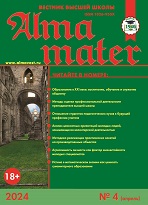UDC 304+(316.3-054)
https://doi.org/10.20339/AM.05-20.058
I.N. Litvinchuk is Cand. Sci. (Philology), doc. at V.I. Vernadsky Crimean Federal University e-mail: irinlitvi@gmail.com
Presented are principal results of experimental pilot investigation of the nature of value orientations in relation to various factors of self-actualization of Crimean student youth in cross-cultural interaction. A questionnaire «Self-actualization of personality in cultural interaction» had approved as author’s method. The interdisciplinary theoretical and practical grounds for creation of this methodology and peculiarities of its application are discussed in the article. Questionnaire features various factors of personality self-actualization of which the following ones are the subject of discussion in the article: “Existential orientation towards the present or the past/future”, “Purposes and means of activity”, “Solidarity with society in whole or with particular group”, “Degree of autonomy/conformism towards cultural-ethnic group influence”, “Predominant focus on positive/negative experience”, “Detachment / involvement to the process of cross-cultural interactions”. Qualitative differences in value orientations of young representatives of main ethno-cultural groups of Crimea, i.e. Russians and Crimean Tatars towards the process of self-actualization in cultural interaction are defined. Differences in strategies of socio-cultural environment mediation have been defined. Identification of similarity/distinction traits in the ways of self-identification of personality most widespread in various subjects of socio-cultural interaction generates prerequisites to predict pragmatics of various socio-cultural stimuls influence onto the nature of civilizational processes in multiethnic regions.
Key words: values, self-actualization, ethnocultural groups, standardized survey, sociology of communication.
References
- Dobrenkov, V.I., Kravchenko, V.I. Methods of sociological research. Moscow, 2019.
- Emelyanenko, T.V. Methods of inter-cultural researches in values. Sociology: methodology, methods, mathematical models. 1997. No. 9. P. 32–54.
- Kolomiets, V.P. Sociology of mass communication in society of communicative abundance. Sociological researches. 2017. No. 6. P. 3–14.
- Brislin, R.W., Looner, W.J., Thorndike, R.M. Cross-cultural Research Methods. New York. 1973. P. 38.
- Diener, E., Tay, L. Needs and subjective well-being around the world. Journal of personality and social psychology. 2011. Vol. 101(2). P. 354–365.
- Edwards, A. Edwards Personal Preference Schedule. New York, 1976.
- Frick, W.B. Conceptual foundation of self-actualization. A contribution to motivation theory. Journal of humanistic psychology. 1982. Vol. 22(4). P. 32–52.
- Geller, L. Another look at self-actualization. Journal of humanistic Psychology. 1984. Vol. 24 (2). P. 93–106.
- Guven, O.G., Akun, F.A. Self-actualization, self-efficacy and emotional intelligence of undergraduate students. Journal of advanced management science. 2017. No. 3. P. 170–175.
- Hambleton, R.K. The Next Generation of the ITC Test Translation and Adaptation Guidelines. European Journal of Psychological Assessment. 2001. No. 3. P. 164–172.
- Irvine, A., Drew, P., Sainsbury, R. Am I not answering your questions properly? Clarification, adequacy and responsiveness in semi-structured telephone and face-to-face interviews. Qualitative Research. 2012. Vol. 13(1). P. 87–106.
- Kreitler, Sh., Kreitler, H. Meaning, Culture and Communication. Journal of Pragmatics. 1988. Vol. 12. P. 725–742.
- Lechuga, V.M. Exploring culture from a distance: The utility of telephone interviews in qualitative research.International. Journal of Qualitative Studies in Education. 2012. Vol. 25(3). P. 251–268.
- Litvinchuk, I. Self-actualization of personality in civilizational interaction. World Collection of Scientific Works. 2013. Vol. 25. P. 9–19.
- Mitchell, K. Educating the national citizen in neoliberal times: from the multicultural self to the strategic cosmopolitan. Transactions of the Institute of British geographers. 2003. Vol. 28. P. 387–403.
- Myers, M.B., Calantone, R.J., Page, T.Jr.J., Taylor, C.R. An application of multiple-group casual models in assessing cross-cultural measurement equivalence. Journal of international marketing. 2000. Vol. 8 (4). P. 108–121.
- Reese, G., Proch, J., Finn, C. Identification with all humanity: the role of selfinvestment and self-definition. European journal of social psychology. 2015. Vol. 45. P. 426–440.
- Rokeach, M. Understanding Human Values: Individual and Societal. Free Press. 2000.
- Schultze, U., Avital, M. Designing interviews to generate rich data for information systems research. Information and Organization. 2011. Vol. 21(1). P. 1–16.
- Sireci, S.G., Berberoglu, G. Using Bilingual Respondents to Evaluate Translated-adapted Items. Applied Measurement in Education. 2000. No. 3. P. 229–248.
- Smith, Sh.D., Dugan, S., Trompenaars, F. National Culture and the Values of Organizational Employees. Journal of Cross-cultural Psychology. 1996. No. 2. P. 231–264.
- Schwarts, S. H., Sagiv, I. Identifying Culture Specifics in the Content and Structure of Values. Journal of Cross-cultural Psychology. 1995. No. 1. P. 92–116.
- Thagard, P., Wood, J.V. Eighty phenomena about the self: representation, evaluation, regulation, and change. Frontiers in Psychology. 2015. Vol. 6. P. 1–16.
- Warren, C.A. Qualitative interviewing. In: Handbook of interview research: Context and method. Thousand Oaks, CA: Sage. 2002. P. 83–101.











.png)






